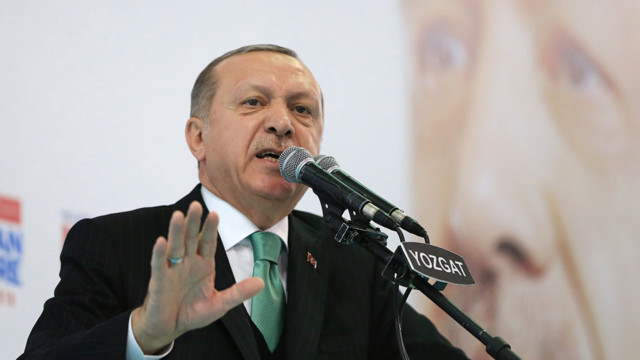Turkey’s president on Monday denounced U.S. plans to form a 30,000-strong Kurdish-led border security force in Syria, vowing to “drown this army of terror before it is born,” as Russia and Syria also rejected the idea.
President Recep Tayyip Erdogan also warned U.S. troops against coming between Turkish troops and Kurdish forces, which Ankara views as an extension of Turkey’s own Kurdish insurgency.
CGTN’s Michal Bardavid has more.
Turkey has been threatening to launch a new military operation against the main Syrian Kurdish militia, known as the People’s Defense Units, or YPG, in the Kurdish-held Afrin enclave in northern Syria. The YPG is the backbone of a Syrian force that drove the Islamic State group from much of northern and eastern Syria with the help of U.S.-led airstrikes.
Russia has also warned that the nascent U.S. force threatens to fuel tensions around Afrin.
“The United States has admitted that it has created a terrorist force along our country’s border. Our duty is to drown this army of terror before it is born,” Erdogan said in a speech in Ankara.
The U.S.-led coalition declined to comment on Erdogan’s threats.
“Turkey is a valued member of a 74-member Coalition and a NATO partner, sharing our mission to ensure the lasting defeat of (IS) in Iraq and Syria. It would be inappropriate for us to comment on Mr. Erdogan’s remarks,” the coalition said in an email to the Associated Press.
The coalition said the new force, expected to reach 30,000 in the next several years, is a key element of its strategy in Syria to prevent the resurgence of the IS group in Syria.
“A strong border security force will prohibit (IS) freedom of movement and deny the transportation of illicit materials,” the coalition said in a statement to The Associated Press. “This will enable the Syrian people to establish effective local, representative governance and reclaim their land.” The SDF currently controls nearly 25 percent of Syrian territory in the north and east.
The core of the force is to be made up of fighters from the existing Kurdish-led Syrian Democratic Forces, the coalition’s ally in the fight against IS. Some 230 cadets have already been recruited to the new border force, according to the coalition. The force is expected to be deployed along the borders of the SDF-held areas and Iraq and Turkey.
Turkey sent troops into Syria in 2016 to prevent Syrian Kurdish fighters from forming a contiguous entity along its border. It has also supported rival Syrian rebels and independently fought to drive IS from parts of Syria.
Tensions with Washington have repeatedly erupted over its support of the SDF, prompting U.S. troops to deploy in northeast Syria to prevent clashes between the Kurdish forces and Turkey-backed fighters.
In recent days, Turkey said it would soon launch a new operation in Afrin and sent reinforcements to the border. Russia deployed military observers to Afrin last year in an effort to prevent Turkish-Kurdish clashes.
On Monday, Erdogan said preparations for the military assault on Afrin “are complete,” adding that an operation could start any moment. He said Turkish troops are already firing artillery at Afrin from the border.
“Don’t stand between us and these herd of murderers. Otherwise, we won’t be responsible for the unwanted incidents that may arise,” he said. “Tear off the insignia you have placed on the uniforms of the terrorists so that we don’t have to bury them (U.S. soldiers) together with the terrorists.”
A YPG spokesman in Afrin, Rojhat Roj, said new Turkish reinforcements could be seen arriving at the border overnight. He said they removed parts of the wall already built along the border to allow in new equipment.
Russia said Monday that the new force is a sign Washington “doesn’t want to preserve the territorial integrity of Syria.” Foreign Minister Sergey Lavrov said the nascent border force is “not helping calm the situation.”
Moscow is a main backer of Syrian President Bashar Assad, while Turkey supports the Syrian opposition. But they came together last year along with Iran, another Assad ally, to set up “de-escalation” zones that have reduced much of the fighting. Since then, Turkey’s ties with Russia have warmed as relations with the U.S. have deteriorated.
Assad’s government also condemned the U.S. plans for the border force, calling it “a blatant encroachment upon the sovereignty, unity and territorial integrity of Syria,” and a violation of international law.
Story by The Associated Press
 CGTN America
CGTN America
